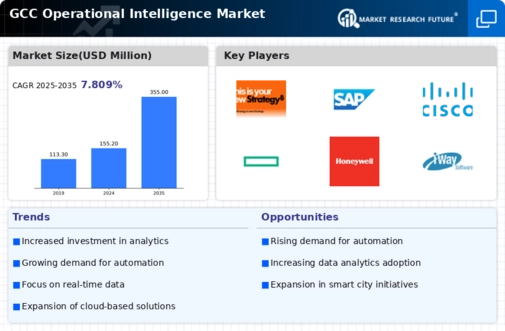Adoption of Cloud-Based Solutions
The shift towards cloud-based solutions is significantly influencing the GCC operational intelligence market. Organizations are increasingly migrating their operations to the cloud to enhance scalability, flexibility, and cost-effectiveness. In 2025, the cloud computing market in the GCC was estimated to reach USD 4 billion, reflecting a growing preference for cloud services among businesses. This transition allows companies to access advanced operational intelligence tools without the burden of extensive on-premises infrastructure. Furthermore, cloud solutions facilitate real-time data sharing and collaboration across different departments, thereby improving overall operational efficiency. As more organizations embrace cloud technology, the operational intelligence landscape in the GCC is likely to evolve, offering innovative solutions tailored to the needs of diverse industries.
Government Support and Regulation
Government initiatives play a pivotal role in shaping the GCC operational intelligence market. Various GCC governments are actively promoting digital transformation through supportive policies and regulations. For instance, the UAE's National Artificial Intelligence Strategy aims to position the country as a global leader in AI by 2031. Such initiatives are likely to foster an environment conducive to the growth of operational intelligence solutions. In 2025, government spending on digital infrastructure in the GCC was projected to exceed USD 10 billion, indicating a strong commitment to enhancing technological capabilities. This support not only encourages local startups but also attracts international players to invest in the region, thereby enriching the operational intelligence landscape.
Integration of Advanced Analytics
The GCC operational intelligence market is witnessing a robust integration of advanced analytics tools. These tools enable organizations to derive actionable insights from vast amounts of data. As businesses increasingly recognize the value of data-driven decision-making, the demand for sophisticated analytics solutions is surging. In 2025, the market for analytics in the GCC region was estimated to reach USD 1.5 billion, reflecting a compound annual growth rate of 15%. This growth is propelled by the need for enhanced operational efficiency and competitive advantage. Companies are leveraging predictive analytics to anticipate market trends and customer behavior, thereby optimizing their operations. The integration of these analytics tools is not merely a trend; it is becoming a necessity for organizations aiming to thrive in a data-centric environment.
Focus on Sustainability and Efficiency
Sustainability and operational efficiency are becoming central themes in the GCC operational intelligence market. Organizations are increasingly prioritizing sustainable practices as part of their operational strategies. In 2025, the market for sustainable technologies in the GCC was projected to grow by 20%, driven by the need to reduce environmental impact and enhance resource efficiency. Companies are leveraging operational intelligence solutions to monitor and optimize their resource usage, thereby minimizing waste and improving sustainability. This focus on efficiency not only aligns with global sustainability goals but also enhances the competitive edge of organizations in the GCC. As businesses strive to balance profitability with environmental responsibility, the demand for operational intelligence solutions that support sustainable practices is likely to rise.
Rising Demand for Cybersecurity Solutions
As the GCC operational intelligence market expands, the demand for robust cybersecurity solutions is escalating. Organizations are increasingly aware of the vulnerabilities associated with digital transformation and the potential threats to their operational data. In 2025, the cybersecurity market in the GCC was valued at approximately USD 3 billion, with a projected growth rate of 12% annually. This surge is driven by the need to protect sensitive information and ensure compliance with stringent regulations. Companies are investing in advanced cybersecurity measures, including AI-driven threat detection and response systems, to safeguard their operational intelligence frameworks. The intersection of operational intelligence and cybersecurity is becoming critical, as organizations seek to maintain trust and integrity in their data-driven operations.






















